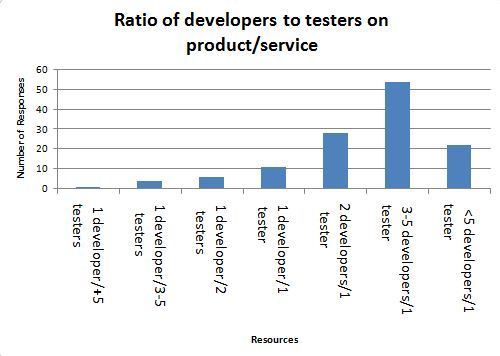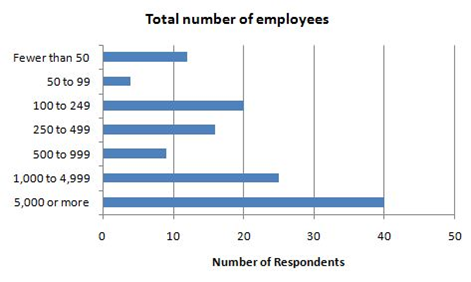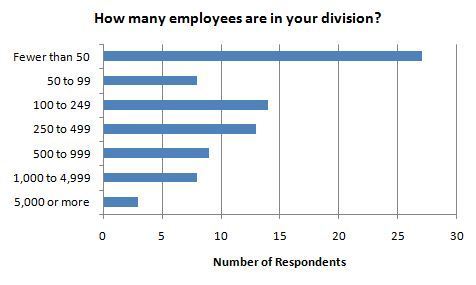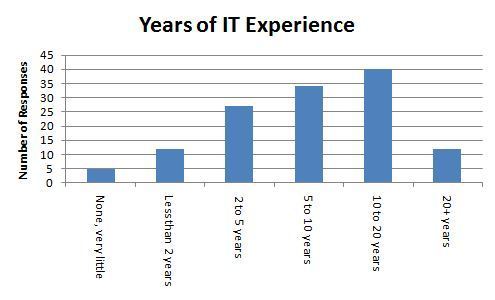 In this installment of the 2010-2011 Global Testing Survey, we analyze the demographics of the more than 100 respondents from 14 countries. The next and final installment will analyze the “For Managers” section of the survey.
In this installment of the 2010-2011 Global Testing Survey, we analyze the demographics of the more than 100 respondents from 14 countries. The next and final installment will analyze the “For Managers” section of the survey.
1. Job Title – for people who test
| Response
Percent |
Response Count |
|
| QA | 12.6% | 13 |
| QC | 1.9% | 2 |
| QE | 3.9% | 4 |
| Tester | 4.9% | 5 |
| Test Engineer | 8.7% | 9 |
| Quality Analyst | 4.9% | 5 |
| V&V Engineer | 1% | 1 |
| Analyst | 1% | 1 |
| Automation Engineer | 3.9% | 4 |
| Test Architect | 1.9% | 2 |
| Senior Tester/ Sr. Test Engineer | 5.8% | 6 |
| Developer (who test their own or other’s code) | 2.9% | 3 |
| Contractor full time | 1.9% | 2 |
| Contractor part time | 2.9% | 3 |
| Consultant full time | 4.9% | 5 |
| Consultant part time | 2.9% | 3 |
| Test Lead | 15.5% | 16 |
| QA Lead | 18.4% | 19 |
Analysis: Most popular job titles for people who test is QA, Test Engineer. 34% of respondents were Leads. Split almost evenly between Test and QA Leads. At least in the US, the QA role is disappearing and being more commonly replaced by QE or Tester/Test Engineer.
2. Job Title – for Managers
| Test or QA Manager | 58.5% | 31 |
| Project Manager | 13.2% | 7 |
| Development Manager | 0% | 0 |
| Division Manager | 3.8% | 2 |
| QA Director | 20.8% | 11 |
| Director of Development | 3.8% | 2 |
Analysis: More than half of all respondents were Test or QA Managers. This makes many of the responses throughout the survey interesting from the perspective that many of the strategies, team dynamics and politics of testing questions were designed for staff QA/Testers but were answered by Leads and Managers who are very often on the front line of political battles and must defend strategy and time estimates. In total, two-thirds of the respondents to the survey were Leads, Managers, Directors.
3. How many people are on your in-house onshore or offshore test team, not outsourced?
| 1 person team | 5.4% | 5 |
| 2 – 5 | 40.2% | 37 |
| 5 – 10 | 18.5% | 17 |
| More than 10 | 35.9% | 33 |
Analysis: The respondents to this survey were mainly distributed between smaller 2-5 person teams and more than 10 size teams. These respondents made up 76% of all respondents. This gives a nice balance to the survey with answers from large and small teams.
4. What is the main reason you were hired?
| SME (subject matter expert/domain knowledge) | 9.2% | 12 |
| Technology knowledge | 13.8% | 18 |
| QA/Testing knowledge | 56.2% | 73 |
| General job skills | 20.8% | 27 |
Analysis: This answer definitely surprised me. Conventional wisdom has it that most testers in the US and western Europe are hired with subject matter expertise. You hire bankers to test banking software! And that conventional wisdom has it that testers are hired in most LCC (low cost countries) where the US and Western Europe outsource/offshore are hired for technical knowledge. Wrong? That over 56% of respondents were hired because of their testing knowledge/skill is great and points to the value of testing knowledge, tester training and understanding quality theory and practices. But it is a surprise. I expected the number of people who test for their subject matter expertise to be the number 1 answer. It is number 4!
5. Which do you feel is most important for testing?
| Technical software testing expertise | 18.6% | 24 |
| Domain/subject matter testing expertise, user focused tests. | 29.5% | 38 |
| QA/Testing knowledge | 51.9% | 67 |
Analysis: This answer follows the previous answer.
6. What is the ratio of developers to testers on your product/service?
 Analysis: In all my consulting work, the most commonly asked question by directors is and non-technical manager is: “what is the average ratio of developers to testers?”
Analysis: In all my consulting work, the most commonly asked question by directors is and non-technical manager is: “what is the average ratio of developers to testers?”
To answer the question, I quote a couple of published company ratios. Microsoft published at one point they had a 1:1 ratio of developers to testers. But, there is no industry standard. Just as banking software is not game software and operating system software is not an e-commerce site, there is no standard ratio. The needs are too different.
A general rule of thumb I use is, if you develop internal software (no external users), the ratio of developers to testers will be much higher. If you are a stock brokerage and your software is for your internal staff, stock brokers or fund managers, the ratio of testers to developers is very low. This is referred to as eating your own dog food (pardon the famous expression). This staff does not have much choice. Yet, in the same company, the teams that make, for example, the web portal for your customers to access their brokerage account information, buy and sell equities, will have a higher ratio of testers to developers. These customers, with the ability to move to another stock brokerage, need testing for ease of use/easy usability, testing to cut the cost of support calls as well as assess risk, assess security and performance and sometimes evaluate user experience against competitors. When you have more demanding customers, more competition requiring higher quality, your ratio will be more testers per developers.
Also affecting the ratio is the platform you support. Even with well automated projects, when you have to support multiple OSs, browsers, languages, mobile devices, devices with embedded systems- these situations will require greater numbers of testers. Consumer products generally have more testers than developers with reputation, support costs, warranty, PR, all potential risks to consumers, pushing the numbers of testers up.
Games have high numbers of testers per developers due to the intense competition in their markets and big revenues.
For our respondents we have 63% with 2, 3, 4, or 5 developers to 1 tester. About 9% with a 1:1 ratio and a total of about 9% with multiples of testers to 1 developer. We also have 16.5% with more than 5 developers to 1 tester.
Looking through the list of companies responding, which will be kept confidential, there are consumer product companies, but the majority of companies make software that stays inside the company, or embedded software, hardware, ERP or B2B products. This majority of companies would have higher multiples of developers to testers.
7. How many years of experience in IT do you have?
Analysis: Considering that two-thirds of the respondents are Leads/Managers/Directors, this makes sense. This is a very experienced groups of survey participants.
8. What is the total annual budget for software and application development products and services at your company? (or at the companies to whom you consult)
9. What is the total number of employees in your company?

10. How many employees are in your division?
 Analysis: we have a good distribution of very large companies, big companies, mid-size and small companies. I often hear from software development teams: “Maybe they do that at big companies, but small companies like ours can’t afford that many testers, can’t afford to send our test team to training, can’t afford an automation tool, can’t take the time to use a test case manager, we’re different…” When in fact, most software development teams, regardless of size of team, are very similar. Many of the questions in this survey point to the fact that regardless of company size, the problems and issues are the same.
Analysis: we have a good distribution of very large companies, big companies, mid-size and small companies. I often hear from software development teams: “Maybe they do that at big companies, but small companies like ours can’t afford that many testers, can’t afford to send our test team to training, can’t afford an automation tool, can’t take the time to use a test case manager, we’re different…” When in fact, most software development teams, regardless of size of team, are very similar. Many of the questions in this survey point to the fact that regardless of company size, the problems and issues are the same.
11. What programming languages are you comfortable with or use in your testing? (you can select multiple answers)
| Java | 38.3% | 44 |
| C, C++ | 34.8% | 40 |
| C# | 29.6% | 34 |
| PHP | 13% | 15 |
| Visual Basic | 40.9% | 47 |
| Perl | 14.8% | 17 |
| Python | 8.7% | 10 |
| JavaScript | 27% | 31 |
| Ruby | 6.1% | 7 |
| Delphi | 4.3% | 5 |
| Unix Shell Scripts | 18.3% | 21 |
| TCL | 7% | 8 |
| Other | 21.7% | 25 |
Analysis: This should burst some bubbles of conventional wisdom that a large percentage of testers are comfortable programming and very many in more than one language. Similar to conventional wisdom that test teams are hired for domain knowledge (wrong), that testers are technically proficient and seem to be moving to be much more technically proficient by the year is an important move for our industry.
12. Do you feel prepared in your job skills to effectively test?
| Not prepared | 3.8% | 5 |
| Somewhat | 7.7% | 10 |
| Partially | 36.2% | 47 |
| Fully | 52.3% | 68 |
13. Is your job technically challenging?
| Yes | 60.2% | 77 |
| Somewhat | 34.4% | 44 |
| No | 5.5% | 7 |
14. Are you happy in your job?
| Yes | 60.6% | 77 |
| Somewhat | 35.4% | 45 |
| No | 3.9% | 5 |
Analysis: For the above answers, the overwhelming response is that people feel well prepared for their jobs and are technically challenged (2 of the 4 components for knowledge worker job satisfaction according to Peter Drucker). Overall, this level of job satisfaction is quite high, especially during years of the global economic slowdown during which this survey was taken.





















